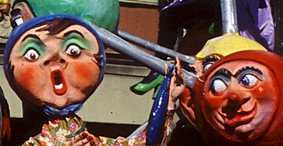
Nobody knows just how long people have been making and eating pancakes but you could almost call the flat bread made by primitive families twelve thousand years ago, a pancake. Pancakes were made by grinding grains and nuts and adding water or milk. This mixture was then shaped into flattened cakes and baked on the hot stones surrounding the fire.
I suspect that the making and eating of pancakes has always been much the same… a noisy, stimulating, exhilarating, greedy, happy time. Pancakes just seem to affect people that way. So it's not too surprising that two happy events for people… pancakes and festivals are often linked together.
Perhaps the best known one is Shrove Tuesday or Pancake Day, which heralds the beginning of fasting in Lent. On this day (so the historians say) there were feasts of pancakes to use up the supplies of fat, butter and eggs... foods that were forbidden during austere Lent.
In France the main ceremonial day, for pancake eating is Candlemas on the 2nd of February. This holy day is six weeks after Christmas and is the day that Christ was presented at the temple by his mother. During this festival, French children wear masks and demand pancakes and fritters.
In various parts of the country, there are different customs. In Province, if you hold a coin in your left hand while you toss a pancake, you'll be rich. And in Brie the first pancake (which is never very good anyway) is always given to the hen that laid the eggs that made the pancake. And it's always regarded as bad luck to let a pancake fall on the floor while tossing it.
Legend has it that Napoleon, who liked to make and eat them with Josephine, blamed the failure of his Russian campaign on one he had dropped years before at Malmaison during Candlemas.

In England there arc several celebrations on this day but perhaps the best known one is the Pancake Day Race at Olney in Buckinghamshire which has been held since 1445. The race came about when a woman cooking pancakes heard the shriving bell summoning her to confession. She ran to church wearing her apron and still holding her frying pan, and thus without knowing it, started a tradition that has lasted for over five hundred years.
According to the current rules, only women wearing a dress, no slacks or jeans, an apron and a hat or scarf, may take part in the race. Each contestant has a frying pan containing a hot, cooking pancake. She must toss it three times during the race that starts at the market square at 11.55 am. The first woman to complete the winding 375 metre course (the record is 63 seconds set in 1967) and arrive at the church, serve her pancake to the bellringer and be kissed by him, is the winner.
She also receives a prayer book from the vicar
On the same day at 11 am at Westminster School in London, a verger from the Abbey leads a procession of eager boys into the playground of the school for the Annual Pancake Grease.
The school cook, who must be something of an athlete to manage it, tosses a huge pancake over a five metre high bar and the boys frantically scramble for a piece. The scholar who emerges from the scrum with the largest piece receives a cash bonus from the Dean. The cook also gets a reward.
Pancakes are the traditional treat of the Jewish Hanukkah festival. They are fried in oil to commemorate the oil found by the Maccabeans when they recaptured Jerusalem from the Syrians, two thousand years ago. The one day's supply of oil for the temple lamps burned miraculously for one week. And, tradition says, the wives of the soldiers hurriedly cooked pancakes behind the lines for their warring husbands.
Large or small, fat or wafer thin and made with a wide range of flours, pancakes are given different names by different peoples. There are Hungarian palacsinta, Chinese egg rolls, Jewish blintzes, Russian blini, Italian cannelloni, Swedish plattar, Mexican tortillas, American hotcakes, German pfannkucken, Norwegian lefser, Austrian nockerin, Welsh crempog and Australian pikelets: but undoubtedly the most famous of them all is the great French crepe.
Click on Link:
Chateau Lalinde : The perfect venue for your event
TAGS: Shrove Tuesday in France Pancakes Events in a chateau Rent a chateau France
Special Events Chateau Lalinde Perigord Dordogne Holidays in France




